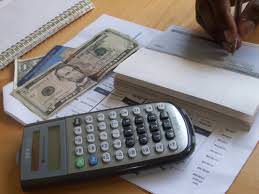Learning how to get a grip on your finances are part of the ordinary transition into adulthood. Today it seems like many people manage to get well into their adult lives without picking up these vital money-management skills. If you’re one of them, don’t worry; reading this article is a great way to start building up your financial savvy, get a grip on your finances and begin to put your financial house in order.
How to Get A Grip On Your Finances
 Right off the bat, you’ll want to start organizing your financial information more thoroughly. With the many modern options for paperless billing, this can be a little tough; a lot of your financial records exist only as digital bits. Nevertheless, if you want to have a thorough command of your financial situation, you need to know how to lay your hands on every salient piece of information. With most of your online accounts, you’ll find you have the ability to retrieve your statements and other records as PDF files. Saving these to your local hard drive is an excellent idea, and you can also print out copies.
Right off the bat, you’ll want to start organizing your financial information more thoroughly. With the many modern options for paperless billing, this can be a little tough; a lot of your financial records exist only as digital bits. Nevertheless, if you want to have a thorough command of your financial situation, you need to know how to lay your hands on every salient piece of information. With most of your online accounts, you’ll find you have the ability to retrieve your statements and other records as PDF files. Saving these to your local hard drive is an excellent idea, and you can also print out copies.
The reason you need to have all of this paperwork is so that you can get a picture of just where your money goes every month. Using the statements from your bank accounts and credit cards, you should put together a complete list of your monthly spending. Your pay stubs will provide a similar record of your income. This is not a one-time procedure. You should take a quick look at this information every month. If you keep other records, (notes of your purchases and / or receipts) you’ll be able to double-check your accounts and make sure you’re not paying for any erroneous charges. The end of the year offers you an opportunity to do a similar analysis on a larger scale. This will help you make longer-term financial decisions and get a grip on your finances.
Of course not every expense you have will show up on a monthly budget, no matter how thoroughly you plan. Unexpected bills can throw a real monkey wrench into your financial organization if you don’t put contingency plans in place for them. As long as you have any extra income whatsoever left over at the end of the month, you should be socking some of it away into an emergency fund. This will soften the blow when the unexpected happens and give you more financial options than you would have otherwise.
Once you’re putting money away for an emergency fund, it’s an excellent time to open a savings account. This is the perfect place to store your emergency money. Withdrawals from a savings account are limited, which means you’ll be less tempted to tap the fund when you don’t need to. Money in a savings account also earns interest, so your fund will grow a little bit on its own even if you stop contributing to it.
The ideas presented here are just a few of the initial steps you can take on the road to financial responsibility and get a grip on your finances. It’s important to start practicing these procedures as soon as possible. The more experience you get managing your money, the less time and effort it will take you. Soon you’ll have mastered the basics and be ready to look at more advanced methods for safeguarding and growing your money. You following above methods, you get a grip on your finances.
